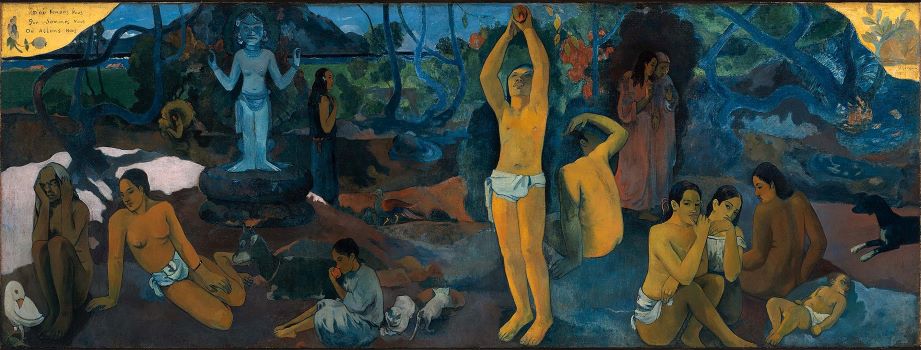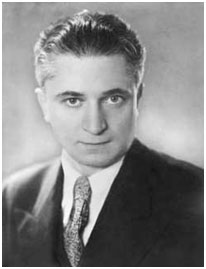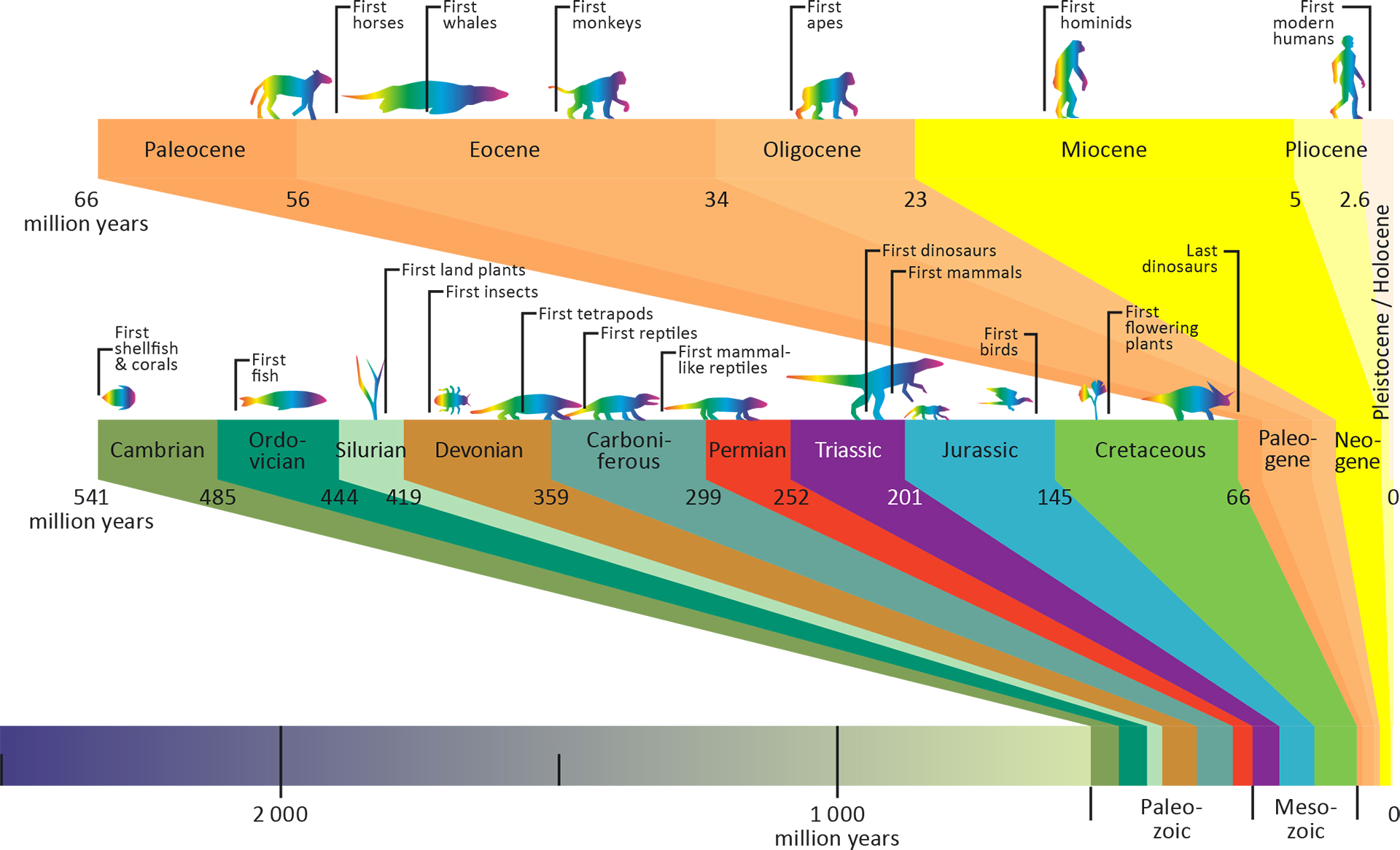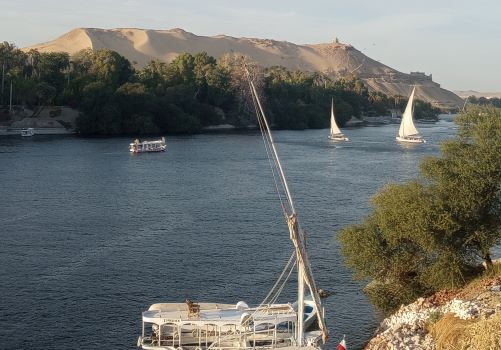Where do we come from? What are we? Where are we going?

History is the medium of politics. Without knowledge of history, politics becomes untethered, suspect, of little worth. History will never be a science as it cannot be reset and repeated to prove any given theory. It's impenetrable to the scientific method, the very process that created modernity, yet history remains essential for answering, as Gauguin asked, “Where do we come from? What are we? Where are we going?” More invaluable than ever, history is lost today, deflated to worthlessness by jaundiced focus and buried by technology, science's omnipotent societal shaping force.
Last century birthed great insights in historical studies, maybe none greater than Fernand Braudel's, The Mediterranean and the Mediterranean World in the Age of Philip II, a seminal work rewriting historical understanding. In the introduction Braudel sets out his wonderful theory of history, comparing it to numerous intersecting currents of various depths and speeds. Deep at the bottom, moving slowly, largely beyond the constructs of an average human life, even beyond the perception of ages, are the shaping forces of geography, geology, and climate. Bodies of waters such as the Mediterranean, its surrounding mountain ranges, vast plains, and deserts, change little over the course of millennia, fundamentally shaping each society built around and across them.
Braudel writes,
“(It is) history that is almost changeless, the history of man in relation to his surroundings. It is history which unfolds slowly and is slow to alter, often repeating itself and working itself out in cycles which are endlessly renewed... which exists almost out of time and tells the story of man's contact with the inanimate.”
Easy examples are Egypt's five-thousand year history shaped today as it was five-thousand years ago by vast desert and the narrow ribbon of lush life produced by the Nile flowing from the far away mountains of inner Africa. Or Istanbul, across thousands of years, whether Greek, Roman, Christian or Muslim, shaped by its position on the Bosphorus Strait connecting the Black Sea to the north and the Mediterranean to the south.
Above and through these deeper currents flow the histories of societies, the “history of gentle rhythms, of groups and groupings...economies and states, societies and civilizations.” These currents are not as deep or fundamental as geography, they move faster, maybe a little, though not necessarily better, understood by the peoples whose lives they direct.
History's surface currents Braudel refers to as l'historie evenementielle, the movement of contemporary events by individuals, “a surface disturbance, the waves stirred up by the powerful movement of tides.” Braudel warns these events, emotionally charged for the participants and those who immediately follow, in many ways offer the least historical knowledge. Poetically writing of the seduction of contemporary events, Braudel states,
“We must beware of that history which still simmers with the passions of the contemporaries who felt it, described it, lived it, to the rhythm of their brief lives, lives as brief as are our own... A world of vivid passions certainly, but a blind world, as any living world must be, as ours is, oblivious of the deep currents of history, of those living waters on which our frail barks are tossed...”
Adding,
“A perilous world, granted, but one whose spells and dangerous enchantments we will have exorcised by having previously charted those great underlying currents which so often run silently, and whose true significance emerges only if one can observe their workings over great spans of time. Resounding events often take place in an instant, and are but manifestations of that larger destiny by which alone they can be explained.”

Nonetheless, through this current of superficial events our short lives interact with history. For any given time, the determinant of health for any politics depends on how well history is incorporated into its movements and decisions. Unknowingly, the Modern Era experienced powerful movements of the deeper and slower currents of history catalyzing the more ephemeral surface events. Paradoxically, the rise of these deep currents were the result of historically unprecedented technological development. The complete lack in understanding of these historical movements and the seeming ahistorical identity of technology leaves contemporary civilization without politics, moved violently by events we neither direct or understand.
In better understanding the present era, the age of Phillip II offers an excellent perspective, a truly remarkable Mediterranean era that saw the peak of the Renaissance, the opening of the Americas to Europe, Spain's affluence, significant cultural change, a flourishing of intellect in the cities, and on its eastern shore the rise of the Ottomans, Islam's last great empire.
The Age of Phillip II is an excellent example of history's various currents moving, crossing, resurfacing and submerging. Encouraged by the fall of Constantinople in 1452, the thought of ancient Greece and Rome resurfaced across Italy and eventually much of Europe. Islam’s triumph saw the end of the last vestiges of the Roman empire, while the rise of Ottomans was the culmination of the Turks long migration out of northeast Mongolia beginning thousands of years before. Constantinople's Christian refugees clutched what they could of their libraries and using the new printing press helped reintroduce ancient Greek and Roman pagan thought to the “West.”
This world, still shaped by the ancient Mediterranean itself, produced the actions of the Medici, Borgia, Michelangelo, da Vinci, Montaigne, Machiavelli, Suleiman the Magnificent, Phillip II, and endless others. Even with all this, Braudel emphasizes history’s deep currents,
“The Mediterranean in the sixteenth century was overwhelmingly a world of peasants, of tenant farmers and anything else was superstructure, the result of accumulation and of unnatural diversion towards the towns. Peasants and crops, in other words food supplies and size of population, silently determined the destiny of the age. In both the long and the short term, agriculture life was all-important. Could it support the burden of increasing population and luxury of an urban civilization so dazzling that it has blinded us to other things? For each succeeding generation this was the pressing problem of every day. Beside it, the rest seems to dwindle into insignificance.”
The era’s most important name for the future was Galileo, who helped start a most radical and new culture. Galileo represents the beginning of modern science that would develop into the most powerful historical force of the past several centuries. Indeed, the Industrial Era's stark demarcation from the entire ten-thousand year Agrarian Era preceding it was the mass movement of people out of the fields and into towns and cities. Using the US as grossest example, the republic's founding saw close to 90% of the population involved in agriculture, a century later just over half. Today, less than 2% of the American population is directly involved in agriculture. Globally, it is estimated only one billion of the earth’s present eight billion people are farmers ― 13%.
Science instigated this great migration. With Galileo's laws of motion, humanity began understanding the physics of mass and force. Over the next two-centuries, ever more rapidly growing scientific understanding led to the innovation of industrial technologies powered by our abilities to harness the power of energy from burning fossil fuels. This scientific revolution developed from a deep current of history, the long evolution of Homo Sapiens' abstract intellect, which began at least as far back as our Homo ancestors, two or three million years ago. Over the last two centuries, this ability for abstract thought exploded our knowledge, but by no means wisdom, of nature at its deepest and most fundamental levels.
Please become a paid subscriber.
The most forceful technological currents of the last two centuries flowed from the burning of fossil fuels. Intriguingly, fossil fuels would be firmly entrenched in Braudel's deepest, slowest moving, barely perceptible historical currents – geology. The surfacing of these currents shaped Homo sapiens life at an unprecedentedly rapid rate to an unparalleled degree. The formation of fossil fuels (coal, oil, natural gas) occurred several hundred million years ago, slowly fermenting over millions of years with pressures from rock pressing down and heat rising from the planet's core. Fossil fuels are the remnants of ancient life, storing the energy of ancient sunlight. Coal was largely formed from the great forests and swamps of the last period of the Paleozoic Era. Oil followed in the Mesozoic Era from great blankets of algae and zooplankton covering the earth's vast seas.

Designed by our several million year old intellect, the burning of fossil fuels from the earth's ancient past literally transformed the entire planet's landscape and atmosphere. Braudel's deep, slow moving past was rapidly brought forth into contemporary time, radically altering how we interact with our surroundings, previously history's slower, deeper, and dominant shaping forces.
All technology homogenize. Diversity is replaced by a sameness created by any given technology's influence. Maybe fossil fuels greatest homogenizing impact has been on plant and animal life, replacing once great roaming hordes and diversity of animals with a relatively few corralled and caged species. While once innumerable variety of plants, human edible plants particularly, were dramatically narrowed to a handful such as corn, rice, and wheat.
In regards to climate, heating and cooling systems can make a frozen landscape temperate, a tropical environment cool. Fossil fuel transportation shrinks, levels, and transcends geographical boundaries, eliminating mountain barriers and shrinking the once vast separation of oceans. Most recently, we've discovered reintroducing massive amounts of ancient organic carbon without a corresponding revitalizing of life leaves seas of carbon in the atmosphere, changing centuries and even millennia old weather patterns
It's also essential to understand the laws of physics from which industrial technologies were created are much more ancient than fossil fuels. Older than the planet itself, they are the fundamental laws of the universe. The last century witnessed even more radical technologies developed with even more fundamental quantum physics. This understanding instantaneously birthed new unprecedentedly powerful technologies, including nuclear weaponry and the transistor. These technologies, based on the most ancient and fundamental workings of the universe, can conceivably alter all established geographic boundaries, culture, and human practices, in ways redefining what it is to be human.
In utilizing this recent knowledge, Homo sapiens transcend history to a greater degree than with industrialization. However, the perceived novelty of quantum technology in reality remains very much as anciently defined as the first stone tool. As Braudel stated the deep currents of history, almost imperceptible to an average life, concern humanity's contact with the inanimate. These new technologies are in a real sense the animation of the inanimate, creating overwhelming societal forces. Quantum physics delves into the eternal dance of the universe's basic order of mass and energy.
Since the dawn of industrialization, even much more in the last decades, it is tempting to forget and disregard history. Yet, history remains our only and quite insufficient measure of technology’s value. Without history, the determinative value of technological development becomes technology itself, a most unnatural, indeed a completely asocial selection system. Technological evolution neither constrained or uninfluenced by any larger environment is a process not simply ahistorical, but in relation to the evolution of life, completely unnatural.
The last century also saw an explosive growth in human understanding of the history of life on earth. Paleontology, anthropology and evolutionary biology further opened the deep past of Homo Sapiens and far beyond. Using this knowledge, particularly with biology, we rapidly move to develop technologies, again, with little understanding of life's long history, overwhelming the very deep historical forces of natural selection. Biological evolution can only be understood as an historical process.
Most ironically, recent decades have seen the rise of a new, spurious theology, based not any metaphysical faith in the past, but unwarranted worship of technology itself. Humanity's long past search for metaphysical meaning in nature, ancient scrolls and the preaching of prophets is replaced by a ridiculous faith in technology's unknowable future. Evangelized across the Industrial Age with the nebulous term of progress, today's technological faith is preached by priesthoods of technologists with the mantra, “It cannot be stopped.” Humanity is becoming locked into an unending, ever quickening, ever changing race with no finish line — a blind faith, not in ourselves, but in technology. It is an ahistorical mindset and ignorance of terrifying proportions.
One only need look at the still unaccounted changes brought about by industrialism, most especially in regards to its impact on innumerable ecological systems and the greater global environment, to understand this faith is not simply misplaced, but exceedingly childish, the wisdom of a toddler barreling down a hallway grasping a razor sharp butcher's knife.
Out technological evolution necessitates a greatly broadened sense of history, an even more essential understanding. Braudel's beautiful and valuable look at history as a series of intersecting currents of variable strengths, speeds, and depths had one fault, it didn't go back nearly far enough. In many ways a traditional historian, Braudel did not include older understandings of “prehistoric” Homo sapiens or biological and physical science. Since his death, just our historical understanding of the genus Homo, expanding back millions of years, has grown exponentially. Prehistorical understandings essential to knowing where we as a species came from, how we were shaped, and who we still very much remain in the 21st century. Deeper historical understanding is essential to both dealing with the still unaddressed legacies of industrialism and to in anyway healthily utilize an entirely new generation of rapidly developing information and biological technologies. Absent history, we have no compass, no direction, the future is all terra incognita, and we are tossed by the waves without even a ship.


